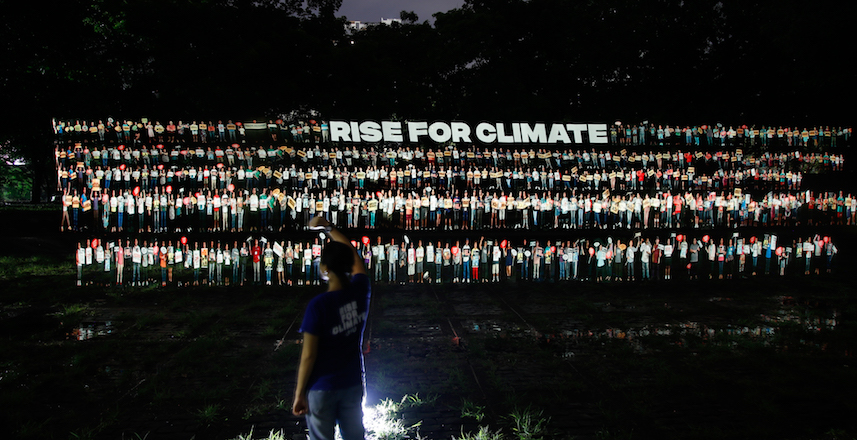On September 8, hundreds of thousands of people marched around the world to demand leadership on climate change, calling on governments to commit to renewable energy and abandon fossil fuels.
The Rise for Climate mobilizations, organized by the 350.org coalition, spanned 95 countries and included over 900 creative direct actions, from the world’s first “virtual march” in Manila to a children’s march in Kampala, and concerts, festivals, and occupations of political offices in cities across the globe.
“Climate change is a global issue — it’s going to impact all of us. And countries in the global south and some of the most vulnerable communities who have had the least to do with creating the climate crisis are the most impacted,” said Thanu Yakupitiyage, an organizer with 350.org, in a phone interview with rabble.
The issues posed by climate change “multiply threats to communities in all regions; it complicate conflicts [and] political situations when people can no longer grow their crops and can no longer survive on their land,” said Yakupitiyage, pointing to the droughts in Central America’s “dry corridor” that have left an estimated two million people hungry and contribute to increasing numbers of people immigrating from the region into the U.S.
Tackling climate change thus requires cross-border mobilization, she says, and Rise for Climate aims to engage a broad swath of civil society to pressure politicians at all levels of government to commit to “a just transition to 100 per cent renewable energy.”
The Rise for Climate actions took place ahead of the Global Climate Action Summit, which starts next week and will convene leaders and politicians from around the world San Francisco, California.
Kalina Hada-Lemon, a Toronto-based 350.org organizer, said in an interview with rabble that she hopes the Summit will result in a “concrete plan from leaders” on transitioning to green energy, adding that politicians need to move away from “talking about fossil fuels versus renewable energy, and instead talk about how these technologies will be integrated and research any adverse effects they might still create on our earth.”

Image: Toma Iczkovits
Labour movement central to climate justice
Actions in Canada and the U.S. were held under the slogan, “Rise for Climate, Jobs, and Justice”, which Yakupitiyage said speaks to the need for robust labour involvement in climate justice organizing.
“The only way [to transition to 100 per cent renewable energy] is if workers are prioritized and training is prioritized, [and] labour organizations recognize that our current path is unsustainable,” she said.
Katie Perfitt, a community organizer with 350.org in Ottawa, noted that the renewable energy sector already employs more Canadians than does the fossil fuel industry.
“The renewable energy sector will only continue to employ more people as we throw our support behind it,” she said in a phone interview with rabble. “A lot of Canadians wanted to use this moment to talk about how we want a fast and just transition to the next energy economy.”

Image: Katie Perfitt
Over 35 Rise for Climate actions across Canada
Some 35 direct Rise for Climate actions took place in Canadian municipalities, with activists buoyed after a recent court decision overturning the federal government’s approval of the Trans Mountain Pipeline expansion project.
Hada-Lemon said the Canadian protests centred on Indigenous land rights and continued resistance to the Trans Mountain pipeline, Alberta tar sands expansion, and Line 3 pipeline.
But while the recent court wins in the resistance to the Trans Mountain Pipeline project are important, Yakupitiyage said that Canadians must continue ramp up efforts to pressure the Trudeau administration to commit to “keep it in the ground” energy policies.
Perfitt, one of the organizers of the Rise for Climate action in Ottawa, says that Canadians are frustrated with how federal and provincial governments often talk about climate policy and action, but in reality “are bending to the fossil fuel industry and supporting resource extraction.”
“We have a provincial government [in Ontario] who has abandoned their commitments to climate action, and it is our job to get them back on track,” said Hada-Lemon.
In Ottawa, 350.org has led a slew of actions in Minister of the Environment and Climate Change and Ottawa Centre MP Catherine McKenna’s constituency.
With this weekend’s action in Ottawa, Perfitt said organizers wanted to do something “creative and different, that allowed people in our community to have the chance to chat with each other and really deepen their connections.”
Over 250 people showed up in Ottawa to screen print banners that organizers will send to frontline communities resisting projects like Enbridge’s Line 3 pipeline and the Trans Mountain pipeline.
“The day allowed a really diverse group of people to come together — a mother and her child painted orca whale Tahlequah and her baby on a huge banner, it was lovely,” Perfitt says.
Sophia Reuss is rabble’s Assistant Editor.
Image: Rise for Climate
Help make rabble sustainable. Please consider supporting our work with a monthly donation. Support rabble.ca today for as little as $1 per month!




